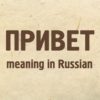Семь пятниц на неделе
Hello everyone! In today’s episode of Very Much Russian podcast we will learn who has seven Fridays in a week according to Russians.
До́брый всем день!
Good day everyone!
Сего́дня я поделю́сь с ва́ми выраже́нием, кото́рое сама́ часте́нько испо́льзую – семь пя́тниц на неде́ле. Выраже́ние у него́ семь пя́тниц на неде́ле опи́сывает непостоя́нного челове́ка, кото́рый ча́сто меня́ет реше́ния, отступа́ет от свои́х слов, не выполня́ет обеща́ний и т.д. и т.п.
Today I’ll share with you an expression that I use quite often myself – ‘seven Fridays in the week’. The phrase ‘he has seven Fridays in the week’ describes an inconstant person that often changes his decisions, comes back on his words, doesn’t fulfill his promises and so on.
Происхожде́ние фра́зы достове́рно не изве́стно, но одна́ из на́йденных мной тео́рий дово́льно интере́сна.
The exact origin of the expression is not known, but one of the theories I found is quite interesting.
А на́чалось, всё, как во́дится, в старину́, когда́ пя́тница была́ свобо́дным от рабо́ты, а зна́чит “база́рным” днём. А посе́му, на пя́тницу приходи́лась да́та исполне́ния разли́чных торго́вых обяза́тельств, наприме́р, привезти́ това́р за полу́ченные неде́лю наза́д де́ньги, и́ли отда́ть долг за полу́ченное в креди́т. О наруша́ющих э́ти обеща́ния и ста́ли говори́ть, что у них семь пя́тниц на неде́ле. Возмо́жно та́кже, что свя́зано э́то с бли́зостью звуча́ния “пя́тница” и “пя́титься / идти́ на попя́тную”: семь раз на неде́ле попя́титься.
It all started, as usual, in the old days, when the Friday was a free from work day, which meant a market (bazaar) day. Thus, Friday was a day of execution of various trade obligations, for example, bringing the goods for received a week ago money, or pay the debt for the goodies received in credit. People who violated these promises ware known as ‘having seven Fridays in the week’. It is also possible that it’s due to the proximity of the pronunciation of “пятница” and “пятиться / go back on your word”: to come back on one’s words seven times a week.
Кста́ти, сочета́ние и т.д. и т.п. из нача́ла подкаста, что как изве́стно, расшифро́вывается как и так да́лее, и тому́ подо́бное, мо́жет быть испо́льзовано в разгово́рной ре́чи и́менно в тако́м вот сокращённом ви́де – и тэ дэ и тэ пэ. Большинство́ поймёт. Друго́й разговорый вариа́нт с э́тим же значе́нием – и всё тако́е. Наприме́р:
By the way, the expression “и т.д. и т.п.” from the beginning of the podcast, which as well know means “and so on and so forth”, can be used in the colloquial speech in this exact shortened way – “и тэ дэ и тэ пэ”. The majority will understand. Another colloquial variant with the same meaning – “and all like that”. For example:
Она́ прихо́дит раз в неде́лю, мо́ет полы́, вытира́ет пыль, и всё тако́е.
She comes once a week, washed the floor, cleans the dust, and all like that.
На э́том всё на сего́дня. Жела́ю вам име́ть среди́ бизнес-партнёров и колле́г то́лько тех, у кого́ в неде́ле все дни прису́тствуют. До ско́рой встре́чи! 🙂
And that’s it for today. I wish you to always keep your Friday under your Saturday, and to have among your business partners only those who’s weeks have all the days inside. See you soon! 🙂
Bonus
Enjoy a bit of Friday Russian humor. 🙂





Subscribe to our basic newsletter and receive notifications about new episodes of Very Much Russian podcast.
Or subscribe to our premium newsletter to receive both the basic newsletter and all our previous podcast episodes, one by one, on a regular basis.
Today's vocabulary
- у него семь пятниц на неделе
Russian idioms[u nee-VO sem' PYAT-neets na nee-DYE-lye]he keeps changing his mind, he's got a mind like a butterfly, he can never settle on anything - у тебя пятница из-под субботы торчит
Funny Russian expressions[u tee-BYA PYAT-nee-tsa iz-pat su-BO-ty tar-CHEET](lit.: your Friday is sticking out from under your Saturday) means your lower layers of cloth are visible from under the top layers - и всё такое
Conversational Russian[ee fsyo ta-KO-ye]and all like that (colloquial)










